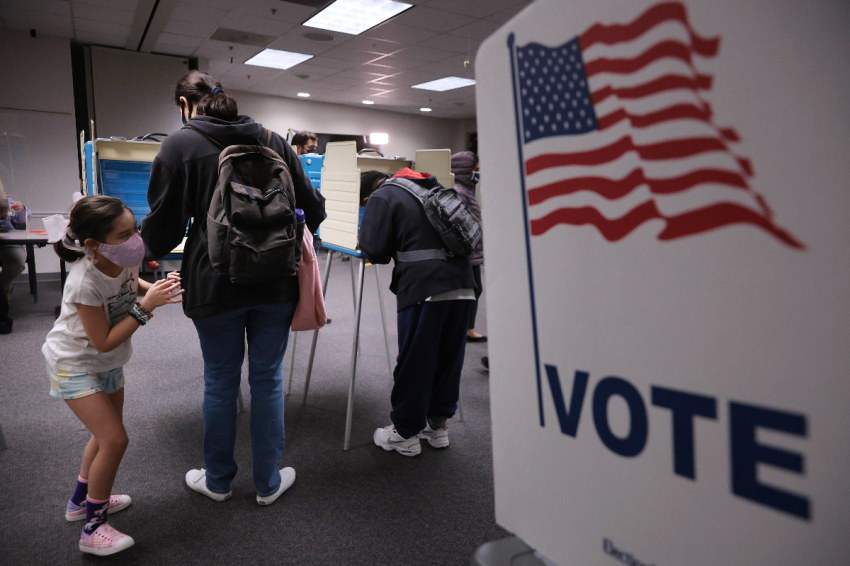77% of voters say education is important midterm election issue: poll

Education remains a big issue for voters as the midterm elections draw nearer, according to a new poll, alluding to how similar concerns led Republicans to victory in Virginia’s gubernatorial race last year.
Rasmussen Reports released the results of a national survey Wednesday that found 77% of likely voters believe education will be an important issue during the Nov. 8 midterm elections, and 45% anticipate it will be “Very Important.”
Only 18% of participants doubt that education will be an important issue this November. The report also noted that 68% of voters worry that public schools are promoting “controversial beliefs and attitudes, with 49% stating that they are “Very Concerned.”
Another 30% of voters say that they are not concerned about the content promoted in schools, with 14% of participants stating that they are “Not At All Concerned.”
Supporters of President Joe Biden were among the least concerned about the material being taught in schools, with only 22% of participants who approve of the president’s job performance saying they’re “Very Concerned.” Eighty-five percent of voters who disapprove of Biden’s job performance, however, expressed the opposite opinion.
The survey also found that majorities in every political category (87% of Republicans, 51% of Democrats, and 67% unaffiliated voters) have at least some concerns about the beliefs schools might be teaching students.
Republicans (72%) were more likely to say they are “Very Concerned” about schools teaching controversial material, compared to 27% of Democrats and 49% of unaffiliated voters.
Majorities of every racial category — 79% of whites, 74% of black voters and 75% of other minorities — expect the issue to at least be somewhat important for this year’s elections, according to the report. White voters (50%) were more likely to say they’re “Very Concerned” about the types of material promoted in public schools, compared to 38% of black voters and 51% of other minorities.
Age appears to play a factor in whether participants saw controversial teachings in school as an important issue, with voters under 40 being less likely to say they’re “Very Concerned” about it compared to older ones.
Income levels also appeared to have an impact on how concerned voters are that schools may be teaching inappropriate material. Those with an annual income below $50,000 were more likely to say they were “Very Concerned” about the issue.
In addition, the report found that college graduates are less worried about the material schools are teaching children.
Democrats (37%) were less likely to see education as a “Very Important” issue in the upcoming congressional elections, compared to 57% of Republicans who believe it will be. Forty-two percent of unaffiliated voters expect education will be “Very Important” during midterms.
Forty-two percent of private sector workers and 45% of government workers said that they think education be will a “Very Important” issue this year, and 51% of retirees answered the same.
The report surveyed 1,000 likely voters in the U.S. online and by phone from Oct. 4-5, with a margin of sampling error of +/- 3 percentage points with a 95% confidence level.
Last October, Rasmussen Reports found that 76% of American voters were concerned about the content taught in schools, including 58% who stated that they were “Very Concerned.” Twenty-one percent of participants said that they were not worried about schools promoting controversial topics.
As the report noted, Republican Gov. Glenn Youngkin defeated his Democratic challenger Terry McAuliffe in the Virginia gubernatorial race due to ongoing debates at the time surrounding parental involvement.
According to The Associated Press, Biden won the state by 10 points over former President Donald Trump.
Last year, two schools in Loudon County, Virginia, attracted controversy amid reports of two sexual assaults committed at two separate high schools by the same male student. The boy reportedly wore a skirt in one incident and entered the girls’ bathroom.
The incidents reportedly occurred before Loudoun County officials implemented a policy allowing trans-identifying students to enter opposite-sex bathrooms and other single-sex spaces.
Last month, Virginia's Department of Education under Youngkin released a directive ordering all 133 public school districts to no longer allow students to enter opposite-sex bathrooms and other private spaces. Students seeking to be addressed by their chosen pronoun must file legal documents.
The directive also says that schools must "keep parents fully informed about all matters" related to a child's health and social and psychological development," and they must not conceal information related to the child's gender dysphoria from parents.
According to the FiveThirtyEight Deluxe Model, updated on Friday, the odds are 71 in 100 that Republicans will win the House, compared to 29 in 100 for Democrats. The model predicts that the odds are “slightly” more in favor of Democrats winning the Senate at 66 in 100 compared to 34 in 100 for Republicans.
Samantha Kamman is a reporter for The Christian Post. She can be reached at: samantha.kamman@christianpost.com.



























